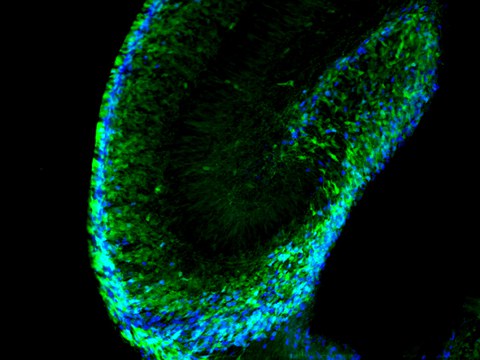Research
PREVIOUS AND CURRENT RESEARCH
Adult neurogenesis and stem cell biology of the adult brain
Against common wisdom even the adult and aging brain can generate new neurons from a population of resident stem cells but it does so only in two privileged regions and on a minute scale. This process, adult neurogenesis, however, is tightly linked to brain function in the hippocampus, a brain area centrally involved in learning and memory processes. This connection makes it likely that adult neurogenesis serves a fundamental function for higher cognitive functions.

During pre-natal brain development of the hippocampus, stem cells (green) migrate into the region, in which lifelong production of new neurons (“adult neurogenesis”) can be found.
Why is activity good for the brain?
It is common wisdom that leading an active life is beneficial. But how do changes on a cellular level contribute to adaptation processes that allow the brain (and with it its owner) to age successfully? How can we train our brains to better withstand disease and age-related impairment? What can we do, if impairment and disease are already there? Both physical and cognitive activity regulate adult neurogenesis. Thereby, training and activity very directly act upon stem cells in the brain and induce them to produce neurons that serve a function in learning and memory.
CRTD - Adult neurogenesis - Prof. Dr. Gerd Kempermann, research group leader at CRTD/DZNE
Plasticity in neurodegenerative disease
Our group is a joint endeavor at the CRTD and the DZNE, the German Center for Neurodegenerative Diseases, site Dresden, where we place our emphasis on how new neurons contribute to building a “neurogenic reserve” in rodents and humans (https://www.dzne.de/kempermann).
The Genomics of Regeneration group at the CRTD is interested in adult neurogenesis and stem cell biology of the adult brain, covering four research areas:
- We examine the activity-dependent control of adult neurogenesis and of other precursor cell populations in the brain and try to understand how the stem cells receive and translate the signal that new neurons are needed. To reach this aim we study adult neurogenesis in the mouse brain and use environmental enrichment (as a cognitive stimulus) and voluntary physical activity as stimuli to increase adult neurogenesis. We study systemic factors that might be involved in the crosstalk between periphery and the stem cell niche and are particularly interested in the role of T cells in this context.
- We also mimic these conditions on isolated precursor cells in cell culture experiments and try to understand, how genes and environment interact at the level of stem cells in vitro. We develop new strategies to isolate pure stem cell populations from the adult hippocampus and use both neurospheres and adherent monolayer cultures to study these cells in in vitro. We improve culture protocols and use biomaterials to make culture conditions more life-like.
- We investigate how the activity-dependent regulation of adult neurogenesis functions at the molecular level. We are not so much interested in the particular contribution of individual genes (as important as these obviously are) but in the behavior of large genetic networks — hence the emphasis on genomics rather than genetics in our group name. We use large-scale gene expression studies and phenotypic analyses in defined sets of mouse strains (so-called genetic reference populations) as well as sophisticated bio-mathematical tools to learn about how high-dimensional gene-gene interactions respond to the activity-dependent stimulus and affect the stem cells and developing new neurons.
- We study how exactly new neurons in the adult brain might contribute to brain function and how a failure of adult neurogenesis might contribute to brain disease or cognitive impairment in aging. At the DZNE we closely collaborate with psychiatrists, neurologists, and psychologists to root our mouse research tightly in knowledge from the human situation.
FUTURE PROJECTS AND GOALS
Our goal is to understand how new neurons contribute to brain function and health and disease and how lifestyle and activity build a “neurogenic reserve” to allow functional compensation in the face of old age and beginning dementia.
Our specific aims? Stay tuned …
